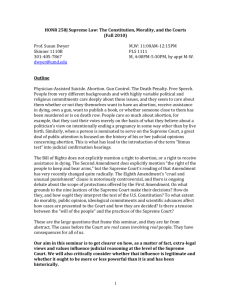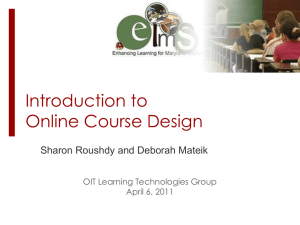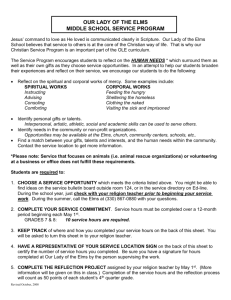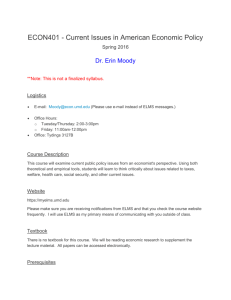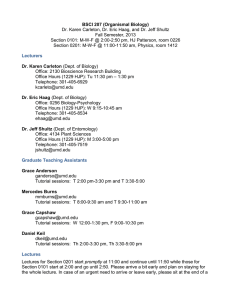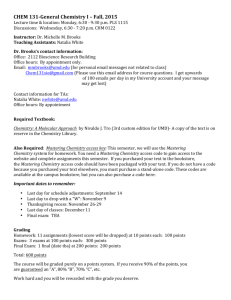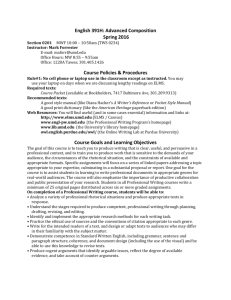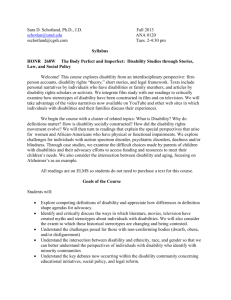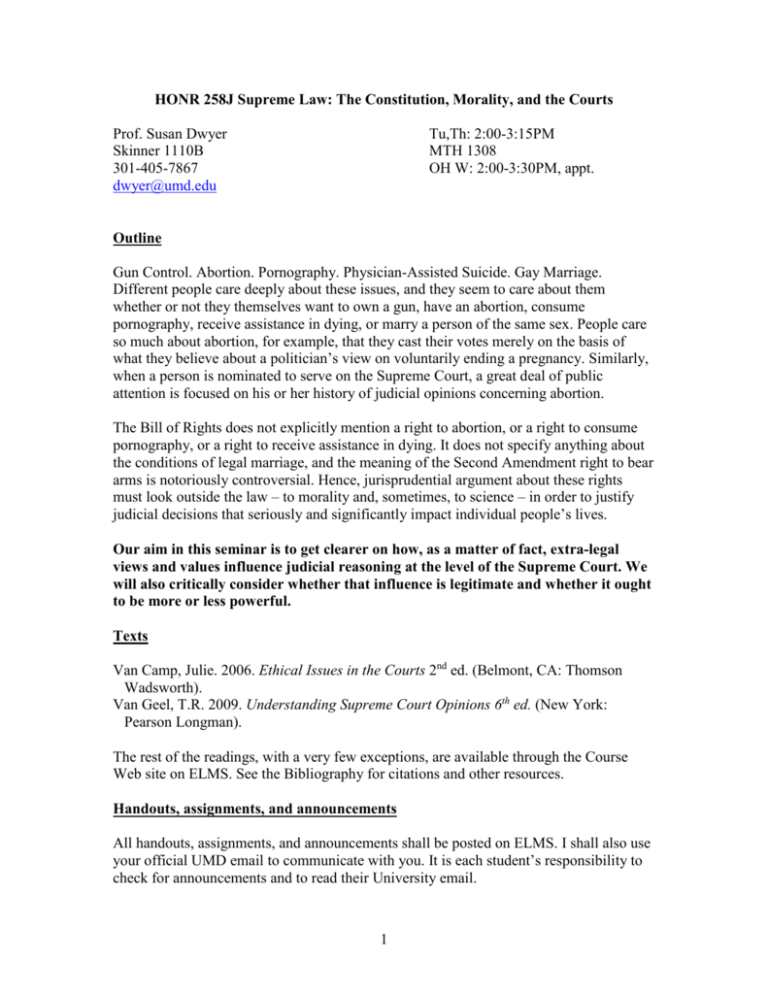
HONR 258J Supreme Law: The Constitution, Morality, and the Courts
Prof. Susan Dwyer
Skinner 1110B
301-405-7867
dwyer@umd.edu
Tu,Th: 2:00-3:15PM
MTH 1308
OH W: 2:00-3:30PM, appt.
Outline
Gun Control. Abortion. Pornography. Physician-Assisted Suicide. Gay Marriage.
Different people care deeply about these issues, and they seem to care about them
whether or not they themselves want to own a gun, have an abortion, consume
pornography, receive assistance in dying, or marry a person of the same sex. People care
so much about abortion, for example, that they cast their votes merely on the basis of
what they believe about a politician’s view on voluntarily ending a pregnancy. Similarly,
when a person is nominated to serve on the Supreme Court, a great deal of public
attention is focused on his or her history of judicial opinions concerning abortion.
The Bill of Rights does not explicitly mention a right to abortion, or a right to consume
pornography, or a right to receive assistance in dying. It does not specify anything about
the conditions of legal marriage, and the meaning of the Second Amendment right to bear
arms is notoriously controversial. Hence, jurisprudential argument about these rights
must look outside the law – to morality and, sometimes, to science – in order to justify
judicial decisions that seriously and significantly impact individual people’s lives.
Our aim in this seminar is to get clearer on how, as a matter of fact, extra-legal
views and values influence judicial reasoning at the level of the Supreme Court. We
will also critically consider whether that influence is legitimate and whether it ought
to be more or less powerful.
Texts
Van Camp, Julie. 2006. Ethical Issues in the Courts 2nd ed. (Belmont, CA: Thomson
Wadsworth).
Van Geel, T.R. 2009. Understanding Supreme Court Opinions 6th ed. (New York:
Pearson Longman).
The rest of the readings, with a very few exceptions, are available through the Course
Web site on ELMS. See the Bibliography for citations and other resources.
Handouts, assignments, and announcements
All handouts, assignments, and announcements shall be posted on ELMS. I shall also use
your official UMD email to communicate with you. It is each student’s responsibility to
check for announcements and to read their University email.
1
Evaluation
You are required to complete 5 pieces of work in order to pass this class. Your grade will
be determined on the following basis:
3 short papers (3-5 pages)
Group project plus individual report
1 long(er) paper (8-10 pages)
Class participation
3 x 10 = 30%
15 + 15 = 30%
20 = 20%
20 = 20%
The due dates for the short and long(er) papers and your individual report of group work
are on the syllabus. We will stick to those dates unless I announce otherwise in class or
via ELMS. All Group presentations will take place on Thursday, February 19.
Class participation
Since this is a seminar, we are jointly responsible for its success. Your class participation
will be assessed in two ways: (1) by the frequency and quality of your contributions and
(2) by your taking responsibility to take the lead on at least one discussion during the
semester. We will discuss how the latter will work on the first day of class.
Academic Integrity
It is central to the mission of any University and to the practice of education generally
that each of us hold ourselves and our colleagues to the highest standards of academic
integrity. Cheating, dishonesty, and plagiarism directly violate the core values of
academe. We are enormously privileged to be part of this learning community, where we
are free to explore things that interest us, to develop our own ideas, and to learn from
others. Certain responsibilities come along with this privilege. In particular, the work you
submit for grading must be your own. You must make every effort to ensure that you
properly credit others when you use their ideas or their words in your papers. If you are in
any doubt about how to do this, talk to me or to your Teaching Assistant. Please also note
that work you have submitted for a grade in another class may not be submitted for a
grade in this class. Please familiarize yourself with the University’s Code of Academic
Integrity available at: www.president.umd.edu/policies/iii100a.html
Policies
These policies apply to everyone enrolled for credit in this course. There will be NO
EXCEPTIONS – NONE. In order to avoid any unpleasantness later, please read
them carefully now.
1. You must complete all assignments in order to pass the class. If you fail to
complete just one of these, you will receive an F for the course. Work is due
on the dates indicated on the syllabus unless I announce otherwise in class or
via ELMS. Please plan ahead.
2
2. If you think you require an extension, you must ask me. You must have serious
grounds for an extension. Work in another class does not count as a sufficient
reason for an extension in this class. When the need for an extension for medical
reasons arises, you must present a medical note. In any case, you must request an
extension at least 2 weekdays prior to the due date. Extensions requested after that
will not be granted. Please note that work that is late without an extension will
not be accepted for a grade and you will fail the course.
3. No re-writes will be allowed. However, I am always happy to read and comment
on a (complete) draft of any of your written work. I encourage you to take
advantage of this. I generally need about 48 hours to comment, depending on how
many drafts I am reading.
4. There will be a 24-hour “cooling off” period after the return of all graded work.
You must take at least a day to read over the comments I have provided before
talking to me about those comments or your grade.
5. I have a zero tolerance policy regarding academic misconduct. If I suspect you of
cheating or plagiarism, I will send a report to the Honor Council. If you are found
guilty of cheating or plagiarism, severe penalties, including expulsion, may result.
3
Syllabus
January
27
Introductory meeting.
End of Life Issues
February
29
Wolf, “Confronting Physician-Assisted Suicide”
Cowart & Burt, “Confronting Death”
Bowron, “The Dying of the Light”
3
In the matter of Karen Ann Quinlan
Cruzan v. Director of Missouri Department of Health
Bouvia v. Glenchur
Short paper 1 DUE (by noon)
Dworkin et al., “Assisted Suicide: The Philosophers’ Brief”
5
10
12
Washington v. Glucksberg
Vacco v. Quill
Battin, “Terminal Sedation”
Gonzales v. Oregon
Callahan, “Organized Obfuscation”
17
The Washington Death with Dignity Act
Quill, “Physician-Assisted Death”
Bush v. Schiavo
19
GROUP PRESENTATIONS
Constitutional Interpretation
24
26
Van Geel, Chapter 4
Brink, “Legal Interpretation”
Individual reports DUE (by midnight)
Ely, Chapter 1 & 3
‘Finding’ Rights in the Constitution
March
3
5
Griswold v. Connecticut
Bork, “The Right of Privacy”
10
12
Roe v. Wade
Discussion cont.
16-20 Spring Break
4
24
26
Bowers v. Hardwick
Lawrence v. Texas
Discussion cont.
Same-Sex Marriage
31
April
2
7
9
Beyer, “Public Dilemmas”
Schaff, “Equal Protection”
Short paper 2 DUE (by noon)
Discussion cont.
Baker v. Vermont
Bonauto, et al., “Brief”
In re Marriage Cases
Goodridge v. Department of Public Health
Discussion cont.
Shifting Sands: The Death Penalty in the U.S.
14
16
21
23
28
30
May
5
Furman v. Georgia
Gregg v. Georgia
Discussion cont.
Short paper 3 DUE (by noon)
Atkins v. Virginia
Dresser, “Neuroscience’s Uncertain Threat”
Discussion cont.
Brink, “Immaturity”
Roper v. Simmons
Discussion cont.
7
Baze v. Bowling
Lee, “International Consensus”
Discussion, cont.
12
15
Last day of class
Long(er) papers due (by midnight)
5

